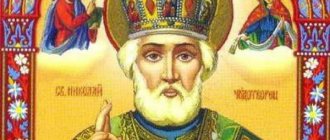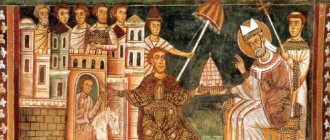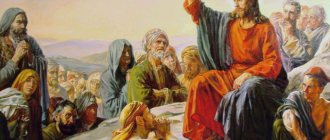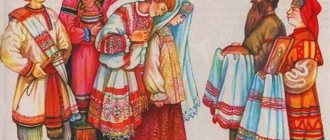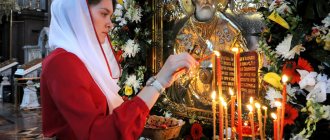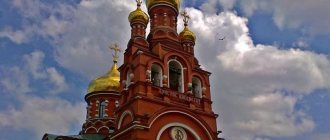In every family where there is no peace, where people who are close to each other constantly quarrel and make scandals, an icon of Guria, Samon and Aviva must definitely appear. These three holy passion-bearers endured incredible torment for the Christian faith at a time when the pagans fiercely persecuted those who believed in the Lord. And although they lived at different times, in the period from 293 to 322, church tradition united their names, since they all accomplished a feat for the glory of their faith in Jesus Christ.
Memorial Day: November 28
The icon “Samon, Gury, Aviv” depicts saints who appear before us in three images: an old man with gray hair (Gury), a middle-aged man with brown hair and a small beard (Samon) and a very young youth (Aviv).
Prayer helpers in preserving the family
Mchch. Gury, Samon and Aviv
In our time, which is only feeling its way to the temple after almost a century of breaking down Russian piety, people come to the temple, alas, only in times of disorder, illness or family troubles. For our great-grandfathers, living in the Church was like breathing—natural from birth. Nowadays, a person is separated from the Church by the bustle of modern life, over-concern, information noise and, most importantly, the absolutely secular, non-church existence of society in the present century. Even the Monk Ambrose of Optina wrote:
“Nowadays, it seems, more than ever, those who want to live piously are surrounded by all sorts of inconveniences and difficulties. It becomes especially difficult to conduct the task of raising children in the Christian spirit and in accordance with the rules of the Holy Orthodox Church,” this is in the 19th century, to say nothing of the 21st.
But salvation is only in the Church. How to return a person to the saving fence? So the Lord helps the salvation of people by allowing them to endure family troubles, sometimes even marital infidelity, in order to stop the squirrel running in the vain wheel of life, to let them get off the carousel, look around and see themselves in God’s light, understand a lot about themselves, and turn to repentance. The Monk Mark the Ascetic said:
“It is impossible to be saved otherwise than through your neighbor, as the Lord commanded, saying: Forgive, and you will be forgiven (Luke 6:37).”
Having suffered, or even better, forgiven your neighbor who sinned against you, it is easiest to move along the path of salvation, which is what God wants. And when this happens and you come to church to pray for yourself, for your family, for the preservation of your marriage, it is worth finding (in any church there is) an icon of the holy martyrs Guria, Samon and Aviv, because they have been revered by Christians since ancient times as prayer helpers in preserving families.
Iconography: how they are depicted on icons
Holy Martyrs Gury, Samon and Aviv
There is a canon for painting icons of holy martyrs. On the icons the martyrs appear in the form of heavenly service at the Throne of the Creator, as victors and His faithful servants. They were granted this closeness to God by their persistent confession of Christ, without betraying Him in the most severe torment. Traditionally, icons of martyrs are painted using red in their vestments.
On the days of the celebration of the memory of the holy martyrs, the color red is also chosen in church veils and vestments. These days, pious parishioners wear red scarves.
Complete Lives of the Holy Martyrs and Confessors Guria, Samon and Aviv
Three of us
The martyrs Guria, Samon and Aviv are written on icons together, as having lived and suffered in the same city, and the day of their birth into eternal life, celebrated in the Church, is common - November 15 (November 28 N.S.), and they were buried together. In addition, posthumous miracles are known from their lives, in which all three of them acted as defenders of an offended and betrayed wife, therefore these three saints are revered by the Church as guardians of family and marriage.
Appearance , vestments, details
The icon traditionally depicts (usually full-length) three men, of which the eldest is Gury, then the middle one is Samon and the youngest is Aviv. Gury and Samon, who according to some sources were brothers, are depicted as elderly people with beards, while the young man Aviv is usually beardless. Gury and Samon are dressed in tunics, with red himation (capes) on top, and crosses in their hands.
Interesting fact
The cross on the icons of the martyrs symbolizes standing on the cross for faith and co-crucifixion with Christ, red is the color of shed blood, as well as the color of life, i.e. symbol of the Resurrection.
Aviv, a former deacon, is depicted in church vestments - in a surplice, with an orarion and a censer. Sometimes in his other hand he holds a box for incense - incense. The burning of fragrant incense in the temple is a symbol of prayer offered to God, just as incense smoke rises upward, so does pure prayer. Such an image on the icon confirms our confidence that the holy prayers of Guria, Samon and Aviv for us sinners reach the Lord. The Apostle Paul says: “We are a aroma of Christ to God” (2 Cor. 2:15). The saints are truly a fragrance to God, but what about us? The gospel in the hands of Abib, sometimes depicted, signifies the Word of God and the gospel of salvation in Christ Jesus.
In the Russian facial composite icon-painting original of the 18th century. The following description of the appearance of the saints is proposed:
Gury with a brad like John the Theologian or hem, and not bald, hair from the ears, robe sankir with white, middle robe cinnabar with white game is white, and the underside is green, in the hand there is a cross, the right prayer, fingers up, and Samon is Russian like Kozma, robe cinnabar with white and white azure is blank, middle azure, like the apostle is girded with the same robe, under a gaff with white and cinnabar, in his right hand there is a cross, and with his left hand he holds it outstretched, Aviv in the image like George the Martyr, in the likeness like Stephen the First Martyr, let go of his right hand to the side, holding a censer in it away from him, and an incense pot in the left.
Stamps
It happens that along the edges around the central image there are stamps - pictures from the lives of saints.
An icon is an image or a kind of “window” into the spiritual world, as if an unearthly image, and therefore, according to the Orthodox tradition, executions on icons of holy martyrs are never written naturalistically, but are presented only symbolically. Nevertheless, it is quite possible to “read” the lives of the saints from the marks, so expressively and in detail the story is told in colors.
Among the marks of the holy martyrs Guria, Samon and Aviv, you can see a story about how a certain girl Euphemia, having become the wife of a visiting foreign soldier and going with him to his homeland, was given by him there as a slave to his real pagan wife. The soldier deceived the girl and her pious mother, saying he was unmarried, and even made a vow at the grave of Guria, Samon and Aviv. For deception and betrayal, he was punished by the holy defenders of the faith. And Euphemia was miraculously delivered from torment and returned to her home as soon as she turned to her intercessors with fervent prayer.
Particularly revered images in Moscow
Mchch. Gury, Samon and Aviv
- A particularly revered image of the holy martyrs Guria, Samon and Aviv is kept in the Church of John the Warrior on Yakimanka and there is also a chapel in honor of these saints. Address: Moscow, B. Yakimanka, 46; nearest metro station: Oktyabrskaya (radial).
- There is an icon of the holy martyrs in the Church of the Life-Giving Trinity in Khoroshev. Address: Moscow, Karamyshevskaya embankment, 15. Directions: from the station. metro station "Polezhaevskaya", then bus. 48, 155, troll. 20, 21, 35, 65, 86 to the stop st. Picturesque, crossing to the opposite side of the highway via an underground passage. Or from Art. metro station "Shchukinskaya", then tram. 28, 30 to the final stop; and also from Art. metro station "Oktyabrskoe Pole", metro station. Sokol metro station, troll. 59 to the final stop.
Icons of saints in other cities
- The revered temple icon of the holy martyrs is kept in Tver in the Church of the Resurrection of Christ (“Three Confessors”), this is an 18th-century temple. Address: Tver, Af embankment. Nikitina, 38.
- There is a chapel and an icon of the martyrs in the Elias Church in the city of Yaroslavl, and on the walls there is an ancient painting with hagiographic paintings of the holy confessors (17th century). Address: Yaroslavl, pl. Sovetskaya, 7.
- An ancient tablet icon (15th century) of the martyrs Guria, Samon and Aviv is kept in the State Historical and Art Museum in Sergiev Posad. Address: Moscow region, Sergiev Posad, Red Army Avenue, 144.
- You can pray at the icon of Saints Guria, Samon and Aviv in Washington, USA. The icon is located near the western wall on the southern choir in St. John the Baptist Cathedral. (4001 17th St. NW, Washington, DC, 20011).
What do martyrs pray for?
They pray to the holy martyrs Guria, Samon and Aviv, as the patrons of marriage, for marriage, for the preservation of the family, for the resolution of all kinds of family troubles.
Offended wives pray to these saints “ if the husband innocently hates his wife.”
Alas, this happens when, having lived a life and already raised children, spouses begin to move away from each other. Let’s not talk about the reasons, let’s just say that if you want to save your family, you should fervently call on the holy martyrs for help, read them an akathist, a prayer, come to church for confession and partake of the Holy Mysteries of Christ. Just be sure to add in prayer: thy will be done, Lord.
Who knows what is good for us? Only He. Perhaps this family crisis was allowed by God so that both spouses would change, take a fresh look at their lives and at each other. “To me,” “mine,” “for me” is not love. Love is a sacrifice. Bearing the infirmities of another in family life, we join in the martyrdom of the saints who endured suffering for Christ, but did not cease to thank the Lord for everything.
Brief Lives of the Saints
Mchch. Gury, Samon and Aviv
These saints lived at the end of the third and at the very beginning of the fourth century in the city of Edessa in Macedonia in northern Greece (some sources write about another city of Edessa in Antioch, but this difference does not affect the essence of the story).
Gury and Samon suffered under Diocletian, who ruled from 284. 305g each During the reign of Diocletian and then under Maximian (305 - 311), Christians were persecuted and executed with particular cruelty. Gury and Samon suffered in 306 (sometimes the year of death is indicated a little earlier - in the period from 293 to 306).
In the lives of the holy martyrs, compiled on the basis of tradition and acts of martyrdom by Saint Demetrius of Rostov (1651-1709), it is said that Gury and Samon were Christians and, burdened by their pagan surroundings, often left the city for solitary prayers. Having learned about the secret Christians, probably through a denunciation, the imperial governor of Edessa ordered the capture of Guria and Samon and forced them to sacrifice to idols. But the saints were not afraid of the pagan judgment seat and firmly confessed Christ.
For this they were sentenced to torture. The chief Muzonius, who arrived from the capital, personally headed the merciless process. The friends did not give in to persuasion, they endured the beatings steadfastly, then they were hung up, tied together, hand to hand, and a weight tied to their feet, and then they were thrown into a dark pit, their feet were driven into wooden stocks, and they were kept there without food in the dark for three months. , forcing the prisoners to lick water from the walls and collect snails.
Remembering the martyrs, Musonius again ordered them to be brought, but they could barely stand on their feet from hunger. Gury was completely weak, but Samon still held on, both did not stop praying and praising Christ. Then Guria, beaten, was again thrown into prison, and Samon was hung upside down by one leg, with a weight tied to the other. Even the guards tried to persuade him to submit, looking at the torment, but the saint prayed like this:
“O Lord my God, without whose will not a single bird will fall into the net (cf. Matt. 10:29), You have enlarged David’s heart in sorrow (Ps. 4:2), and made the prophet Daniel stronger than lions (Dan. 6: 6-18, 14:32). Knowing the weakness of our nature, see the battle rising against us; for the enemy strives to tear away Your inheritance from You; but You, having looked upon us with Your merciful eye, keep in us the unquenchable lamp of Your commandments, correct our feet with Your light and make us worthy to enjoy heavenly bliss, for blessed are You forever and ever.”
Samon's words were recorded by the secretary of the Roman court. After the torture, Samon was again thrown into the same prison with Guria. The torment of the saints ended on November 15, on that day they were again brought to Musonius.
“Who delivered these crowns to the holy martyrs if not their tormentors?”
- says Reverend Zosima. With court records and descriptions of massacres of Christians, the pedantic Roman Empire provided the Orthodox Church with a documentary basis for the canonization of martyrs - acta martyrum - acts of martyrdom.
The martyrs could no longer walk on their own; Samon was dragged under the arms of two soldiers, and Guria was brought in on a stretcher. To the new demands of the ruler to abandon the faith, Gury and Samon responded:
“Whatever you want to do, do it urgently, for we will not cease to affirm that we are slaves of our Lord Jesus Christ, we worship Him alone and reject idolatry.”
Then, in impotent rage, the torturer ordered the execution of the faithful Christians Guria and Samon. On the same day they were beheaded outside the city, their bodies thrown to be devoured by wild beasts. But the townspeople, having learned about the death of the saints, buried their remains with honor.
After several years, under another ruler of Licinia (311 - 324), who ruled the western part of the empire at the same time as the pious Constantine, the martyr Aviv suffered. Liknios trampled on the agreement on the freedom of the Christian faith and brutally dealt with Christians in his cities.
15
November
322 years
On this day the martyr Aviv suffered. This happened in the same city of Edessa, only years after the death of Guria and Samon.
Aviv was a deacon in the church that the townspeople built over the burial place of the holy remains of Guria and Samon. He brought the Gospel word to people, courageously confessing the faith of Christ and calling everyone to turn their lives to Christ.
When it was ordered to seize him, Aviv, without hiding, himself appeared at the trial. When asked to bring incense to the Roman gods, he renounced idolatry, without hesitation confessed Jesus Christ as God and spoke to everyone present about the Resurrection. Fearing the conversion of others to the faith of Christ through his ardent preaching, the ruler ordered the execution of Aviv by setting him on fire.
The martyr himself entered the flame and gave up his soul into the hands of the Lord. When the fire burned down, it turned out that the flames did not damage Aviv's body at all. His own mother, who saw her son’s suffering and strengthened him with prayer, accepted the honorable remains and, anointing him with incense, buried him along with Gury and Samon in their now common temple.
Reverence
The martyrs, having become witnesses (in Greek martyr - μάρτῠρος - witness) confirmed and testified with their blood the Truth of faith in Christ and became partakers of His Redemptive Sacrifice. “You celebrated the Eucharist in your bodies,” writes St. Cyprian of Carthage. The Orthodox Church highly honors the feat of the martyrs who became accomplices in the suffering of Christ; it is not for nothing that the Eucharist is celebrated on their relics. Every church has icons of holy martyrs. The veneration of the holy martyrs is expressed in the Church in the performance of divine services and special services on the days of their memory, in the reading of special prayers dedicated to them - canons, akathists, in the veneration of their holy icons.
Day of Remembrance
According to the Orthodox calendar, the memory of the martyrs Guria, Samon and Aviv takes place on November 28 (November 15, old style). The date is not difficult to remember - the Nativity Fast begins with the celebration of these saints.
Miracle of the Holy Martyrs Guria, Samon and Aviv
Miracle of the Holy Martyrs Guria, Samon and Aviv
On November 28, the memory of the holy glorious martyrs is celebrated - Guria Samon and Aviv, whose biography read on the page Lives of the Martyrs >>
These great saints performed many miracles, both during their lives and after their glorious death. But the most wondrous miracle happened in Edessa in ancient times:
Once upon a time, an wicked barbarian people who lived near Persia and were called Ephalites moved from the east to the Greek kingdom, and, having conquered many cities, reached Edessa itself, with the intention of taking and destroying it, as it destroyed other cities.
And so the Greek kings, who wanted to protect the city from enemies and free it from the siege, gathered many of their soldiers and sent them to help Edessa. Having entered Edessa, the Greek troops remained there for a considerable time, defending the city from the barbarians. There was one warrior in the Greek army, a Goth by origin. In Edessa he happened to live in the house of a certain chaste widow named Sophia, who had an only daughter named Euphemia, whom she cherished like the apple of her eye, keeping her a virgin and teaching good morals and the fear of God. Sofia tried to hide her from human eyes, because she had a very beautiful face; she hid her in a special room so that no man could see her. During the long stay of the Gotf in the house of this widow, he happened to see this young woman one day. Struck by her beauty, he was inflamed with passion for her, and only thought about how to seduce her. Having approached his mother, he began to ask her to give her daughter for him, and, although he had a wife and children in his homeland, he hid this, pretending to be single in order to get what he wanted. However, his mother refused him:
“I will not give my only daughter to a foreign land; you are a stranger, you will take my daughter to your land, and I will be left without her in great sadness, because I have no other child with which I could console myself in my widowhood, except her alone; I will not give her to you, for I cannot live without seeing her face.
Then the Goth, becoming enraged, began to threaten her:
“If you,” he said, “do not give it to your daughter, then I will not leave here until I bring many disasters upon you and subject you to the most extreme grief; After all, I am a warrior, and I can easily cause you any harm I want.
The widow, although she was alone and there was no one who would come to her aid, boldly objected to him. After this, the warrior again, then kindly asked her, then again flew into a rage, and, now with requests, now with threats, persuaded the widow to give her daughter for him. In this way he pestered her the entire time he lived there. He also offered her some gifts, for he was not poor - he bought gold jewelry and expensive clothes for her and her daughter in order to get what he wanted; The widow did not accept the gifts, and avoided him himself, and hid the girl with even greater caution, so that this lawless man would not see her. One day she told him:
– I heard that you have a wife and children in your homeland.
He, overcome by the desire to own the girl and not having the fear of God, began to swear and swear, saying that he had never been married, and that he wanted to have her daughter as his wife and make her mistress over all his property. Then the widow Sophia, believing, finally bowed to his request and agreed to marry her daughter Euphemia to him. Raising her hands to God, she said:
- Master, Father of orphans and Judge of widows, look mercifully on Your creation, and do not abandon this young woman who is marrying an unknown man. Do not despise my orphanhood and do not leave me helpless, for, hoping for Your good providence, I give my poor daughter to a stranger and make You a witness and guarantor of his oaths and promises.
The young woman was married to this Goth and, upon marriage, they lived peacefully. Euphemia conceived, and before she gave birth, the enemies retreated from the city with nothing, for they could not take possession of it, due to the fact that the troops in the city courageously defended the city walls and waged a stubborn struggle with the enemies, especially due to the fact that the city guarded the prayers of the holy martyrs Guria, Samon and Aviv. When the enemies retreated, the Greek troops needed to return home, and this Goth also hurried to his homeland. The mother, weeping inconsolably over the separation from her daughter, tried to take her from the Gothf, not allowing him to take her to a foreign land, but could not dissolve the marital union, sealed by law. When the wicked son-in-law was about to set off with his wife, Sophia brought him and her daughter to the church of the holy passion-bearers Guria, Samon and Aviv and, placing them in front of the tomb of the martyrs, said to her son-in-law:
“I will not trust you with my daughter if you do not give me these saints who suffered for Christ as guarantors; take hold of their holy shrine and swear to me that you will not do my daughter any harm, but will take care of her with due love and respect.”
Gotf, considering this a matter of no importance, immediately fearlessly took up the honorable shrine of the holy martyrs and said:
“From your hands, saints, I accept this young woman and take you as guarantors and witnesses before her mother that I will not do any harm to this wife of mine, I will never offend her, but I will keep her with love and honor her to the end.”
This is what the Goth said, and the wicked man also swore by God, without thinking or fearing that God, the Lord of vengeance, would reward him according to his deeds and destroy him for his wickedness. The mother, after hearing her son-in-law’s oath, said with a cry to the holy martyrs:
“After God, I entrust my daughter to you, oh holy martyrs, and through you I give her to this stranger.”
Thus, having prayed, they gave each other a kind kiss and parted: the widow Sophia returned to her home, and the Goth with Euphemia went on the road, and he let the slave who was with him go away from him, so that this secret would not become known in his house.
When they, having gone all the way, reached the fatherland of the Goth and were already near his house, he rebelled against his wife with great cruelty as an enemy; Forgetting his love for her and neglecting his vows, he took off her expensive clothes and gold jewelry and dressed her poorly, like a captive and a slave, and, drawing his sword, gave her the following order:
“If you want to be alive, then when you enter my house, don’t tell anyone anything about what happened between us, but say that you are a captive, for I have a wife and children in my house; You, be my wife’s slave and obey her in everything, as your mistress; and if you announce to her or tell one of my relatives that I married you, then you will see my sword on your neck and die.
Seeing herself deceived and insulted by the evil barbarian and hearing his threat, Euphemia said to him:
– Is this your love? Is this the fulfillment of your promises? Were these your oaths and was this your intention to make me, your wife, a captive and a free woman a slave? Because of you, I left my mother, relatives and fatherland and clung to you with unfeigned love, trusting your words, which you confirmed with oaths, and you repay me for love with hatred, and, instead of a husband and friend, you became me a barbarian, enemy and tormentor who led me into a foreign land to destroy me.
Having said this, she raised her eyes to heaven and, raising her hands, sighing from the depths of her heart and bitterly crying and sobbing, cried out to God:
- God of my parents, look at my misfortune, hear my sighing and listen to the voice of my prayer! Look at what this perjurer is doing to me, and deliver me from evil disasters, through the prayers of Your holy saints who suffered for You. Oh, holy martyrs Gury, Samon and Aviv! I now call on you: help me, who have fallen into unexpected disaster, for, relying on you, I went with this goth; Be the avenger to him for me and deliver me from trouble.
When she wept so bitterly and prayed secretly in her heart, they entered the Gothf’s house. His wife, seeing Euphemia and noticing the beauty of her face, became agitated with jealousy, for she suspected that her husband was in lawless cohabitation with her, and asked her husband.
-Who is this girl, and where did you bring her from?
He answered:
- This is a captive; I brought her from Edessa to be your slave.
The wife said:
- The beauty of her face reveals that she is not a slave, but a free one.
The husband replied:
“Although she was free in her land, as her appearance shows, she is now your slave.”
Euphemia, unable to say anything from fear, was silent and obeyed the Goth's wife, serving her like a slave to her mistress; she did not know how to do such a thing that could save her from the disasters that had befallen her. And she lived, serving as a slave, always having the holy martyrs in her mind and crying out to them:
“Hurry up to help me, your servant, saints, hurry up to show me mercy and do not ignore the desecration and deception committed against me.”
Her mistress, harboring a feeling of jealousy in her heart, was very cruel and merciless towards her; ordered her to do every difficult task, and tormented her in various ways. The worst thing was that she never wanted to talk to her; Moreover, Euphemia did not know the Gothic language and could not give her mistress any information about herself, and the Gothfa was afraid that he would kill her if she told her mistress anything about herself.
After some time, the Goth's wife found out that Euphemia was pregnant, and became even more jealous of her and rebelled against her with more fierce rage, imposing the most exhausting work on her in order to wear her down in this way. Upon the arrival of the due date, Euphemia gave birth to a male child, with a face completely similar to the Goth, who was his real father. The Gotf's wife, seeing the baby exactly like her husband, was filled with terrible anger and began to think about how to kill this baby. She told her husband:
“Why are you hiding yourself because you haven’t gotten to know this girl?” After all, the baby born by her clearly exposes your work, because he is completely your likeness.
Gotf began to lock himself again, saying:
- This is not true, I never cohabited with her; You have power over her and do whatever you want with her, for she is your captive and servant.
Then this evil woman plotted to poison the baby. After a little time, she prepared a deadly poison, sent the mother away from the baby to do some work, and when the baby was left alone, she poured the poison into his mouth, and the baby soon died. The mother, returning from work, saw the baby lying dead, and was filled with unspeakable grief and was tormented in her heart, in bitter sadness for him. She did not know what was the cause of his sudden death, because no one was in the room when the mistress poured poison into the baby’s mouth. But, while preparing him for burial, Euphemia saw that poison was flowing from the child’s mouth, and then she remembered that her mistress had once threatened to destroy her along with her son, and she guessed who was responsible for the baby’s death. However, she remained silent, not daring to say anything. Taking some wool, she wiped away the poison flowing from the baby’s mouth with it and hid it with herself, not revealing this secret to anyone. The baby was buried.
A few days later the Gotf called his friends for dinner, and Euphemia served at the table. When the time came for her to serve the cup to the mistress, she, wanting to find out whether her baby really died poisoned by the mistress, took the wool with which she wiped her son’s mouth, dipped it secretly in the drink, and then took it out, squeezed it into the bowl and gave this drink to her mistress. She, knowing nothing, drank this cup, and thus misfortune turned on her head, for that same night the Gotf’s wife suddenly died and thus fell into a hole that she herself had dug. The next morning the Goth got up and saw his wife dead, and was horrified by her unexpected death; the whole house was filled with weeping; all relatives, friends and neighbors came together and grieved for her; then, having made a luxurious coffin for her, they solemnly laid the dead woman in it.
When seven days had passed after the burial of the deceased, her relatives remembered the girl brought from Edessa and began to say:
“No one else is to blame for the sudden death of our relative other than this captive, who was always hostile to her.”
And so everyone rebelled against Euphemia, and wanted to present her to the ruler of the region, so that he would torture her to torture how she killed her mistress, but since the ruler was not at home at that time, they changed their intention and decided to bury Euphemia alive along with her deceased mistress. Having opened the coffin of the deceased, they placed Euphemia next to the corpse, which emitted an odor, was infested with worms and was rotting - so that she would die a violent death there. Who can express Euphemia’s grief, her sadness, fear and trembling, fear and horror, sobbing and crying? Let anyone just imagine the fear of a living person imprisoned in a coffin, along with a stinking corpse; fear from the dead, the stench from the corpse, the darkness and closeness of the grave, worms all around, the breath of death and unspeakable suffering! Being in such extreme cramped conditions, Euphemia, in grief of heart, diligently cried out to God from the grave, like the prophet Jonah once in the belly of the whale:
- Lord God of the heavenly powers, who sits on cherubim and sees the abyss, You see the bitterness of my heart and the tightness in this dark and stinking tomb; You know that for the sake of Your name I was given to the lawless Goth, for he swore by Your name when he took me; have mercy on me for the sake of your holy name. You kill and live, you bring me down to hell and bring me to hell (1 Samuel 2:6): deliver me from this bitter death and bring me out of this tomb as from hell, for You are also able to raise the dead - much more can you bring me out of the gates of death me, alive, but near death. Have mercy on me, Master, for the sake of the holy martyrs Guria, Samon and Aviv, whose outpouring of blood and death for You You accepted as a pure sacrifice. Oh, holy martyrs! My enemy has appointed you as guarantors before my mother, so save me.
When she prayed like this in the sorrow of her soul, three luminous men appeared, shining like the sun - the holy martyrs Guriy, Samon and Aviv, and immediately the stinking smell in the tomb disappeared; Euphemia felt a great fragrance emanating from the holy martyrs who had appeared. They told her:
“Cheer up, daughter, and don’t be afraid: you will soon receive salvation.”
When the saints said this, Euphemia’s heart was delighted both from the bright vision of the saints and from their comforting words; filled with joy, she forgot herself and fell into a sweet sleep. During this dream, she was taken from the tomb by the invisible omnipotent power of God, in one hour she was transferred to Edessa, to the church of the holy martyrs Guria, Samon and Aviv, and was laid at their holy cancer. It was night and the usual morning service was being held in the church when it was moved here. Waking up from sleep, she again saw the holy martyrs, who said to her:
- Rejoice, daughter, and find out where you are now; Now we have fulfilled what we promised, go in peace to your mother.
Having said this, they became invisible. Euphemia stood up and looked around to see where she was. Seeing the church walls, icons, candles and the honorable shrine of the holy martyrs and, moreover, hearing the singing of the clergy, she was convinced that she was in Edessa, in the church of her guarantors, the holy passion-bearers of Christ Guria, Samon and Aviv. Then she was filled with unspeakable joy and joy and, hugging with love the tomb of the holy martyrs, with tears she gave thanks to God and His saints for such mercy shown to her. In a feeling of gratitude, she said: “Our God is in heaven [and on earth]; He does whatever he wants” (Ps. 113:11), sent from heaven and saved me; blessed is the Lord who saves those who trust in him: “Weeping may endure for a night, but joy comes in the morning” (Ps. 29:6). When she, with joyful tears, said this and much more, the presbyter heard her words and crying and, approaching her, began to ask her:
-Who are you and why are you crying so much?
She began to tell him everything in detail, how she was given to the Gothfu by her mother at the cancer of the saints, what she suffered from this oathbreaker, how yesterday she was imprisoned in a tomb, and how during her prayer the holy martyrs appeared to her and in one hour carried her from the Gothfa land to this church of theirs.
The presbyter, listening to this, was horrified, marveling at the great power of God. However, he still did not want to completely believe what she was saying, and asked her:
- Who is your mother?
Having learned that her mother was the widow Sophia, the presbyter immediately sent for her, inviting her to come to church. The mother, not knowing anything, immediately came and, seeing her daughter standing at the tomb of the holy martyrs, dressed in poor clothes, was horrified by such an unexpected sight; approaching her, she hugged her, and, falling on her neck, cried; Euphemia also cried, and both were unable to say a word from crying. Then, without quickly calming down her tearful sobbing, her mother asked her:
- How did you end up here, my daughter, and why are you dressed in such bad clothes?
Then Euphemia told her in detail everything that she had suffered in a foreign land from her evil husband, how yesterday she was imprisoned in a coffin and was miraculously saved and transported by the holy martyrs Gury, Samon and Aviv who appeared to her. Hearing all this, the mother’s heart melted with pity, and everyone in the temple, having heard what was told, was very amazed and glorified the almighty power and mercy of God. Having fallen before the tomb of the holy martyrs, the mother in a loud voice offered thanks to God and His saints; and they stayed all that day in the church, praying and thanking God, and with love and zeal hugging and kissing the shrine of the holy martyrs. Late in the evening, the mother and her daughter joyfully went home, praising God.
The next morning, rumors of this miracle spread throughout the city; From everywhere, her relatives and neighbors gathered at the widow’s house and, in horror, marveled at what Euphemia was telling them. Everyone praised the name of the Lord and magnified and glorified the help of the holy martyrs.
Sofia and her daughter spent the next days of their lives in a godly manner. They told everyone about the merciful power of God shown to them. Euphemia said: “The right hand of the Lord is high, the right hand of the Lord creates power!” The right hand of the Lord carried me from the Goths to Edessa: “I will not die, but will live and proclaim the works of the Lord” (Ps. 118:16-17).
God took revenge on the oathbreaker Gotfu in the following way.
After some time, the same wicked people who had previously fought with the Greeks, uniting with the Persians, again went to Greek soil and tried to take the city of Edessa. In view of this, an army was again sent by the Greek emperors to Edessa to protect it. The Goth who, by cunning and flattery, took Sophia’s daughter Euphemia from Sophia also came with this army. He knew nothing about the miracle that had taken place and thought that Euphemia died, imprisoned in a coffin with his dead wife; without embarrassment he came to Sophia’s house, as to his mother-in-law. She, seeing that he had arrived, hid Euphemia in the inner rooms, and received him, appearing as if she was rejoicing at the arrival of her son-in-law. Then, having gathered her relatives and neighbors, she began to question the Gotf in front of them, saying:
– “How did God help you make the journey from here? Didn’t my daughter get sick on the way while she was pregnant, and how she gave birth! I worried a lot about her, since she was pregnant, and I was afraid that some misfortune would happen to her on the road.
He answered:
– God, through your prayers, helped us make our journey safely; your daughter is healthy: she gave birth to a boy. She greets you, and if this path, which we were ordered to take hastily, had not been unexpected, then your daughter would have come with me and the baby to you to bring you comfort; however, she will come at a more convenient time.
Hearing such words, Sophia was inflamed with righteous anger at the lies of this evil man and, tearing her clothes, cried out loudly:
- Liar, crafty man and murderer, where did you put my daughter?
Having said this, she took Euphemia out of the inner rooms, placed her in front of the Goth and said:
“Do you know this girl, who she is, do you know where you imprisoned her, oathbreaker?” You put her to death, you lawless one!
He, having heard these words and seeing Euphemia, trembled, became mute and could not utter a single word, as if dead. Then the widow's relatives and neighbors took him, locked him tightly in the room and remained to guard him at the door. The mother and daughter invited a scribe, described everything that happened to them, leaving nothing out of this wonderful miracle, and, going to the bishop of this city, Blessed Eulogius, gave him this record; They also reported the arrival of the evil and crafty Goth. The bishop, after reading the record, immediately took his clergy and went to the governor who commanded the arriving Greek army, and ordered the record given to him by the widow and her daughter to be read before the governor, in which this wonderful miracle of the holy martyrs was described in detail. The governor, having listened to what he read with attention, was horrified, marveling at the glorious miracle, and everyone who was with him was filled with fear. The governor immediately ordered the Gothf to be brought to him. The widow Sophia and her daughter Euphemia were also presented to him. Again he ordered the record written about them to be read publicly, for many people, husbands and wives, had gathered in the governor’s courtyard. And he asked the Gotf, is what is written true? Gotf replied that this is true, and there is nothing false here. Then the governor said to him:
- Damned murderer! How did you not fear God and His Last Judgment and were not afraid of the oath taken at the tomb of the holy martyrs, whom you made guarantors and witnesses of your promises? Why didn’t you spare the young woman whom you seduced with your cunning? Accept the punishment you deserve for your deeds.
The governor ordered his head to be cut off with a sword. The God-loving bishop earnestly asked the governor not to put the Goth to death, but to show him mercy and leave him alive so that he would glorify the greatness of God. But the governor answered the bishop:
“I’m afraid to have mercy on the one who committed such a great crime, so as not to anger the holy martyrs who were insulted by this perjurer.”
And, by order of the governor, the Goth was beheaded. Thus this accursed man received retribution; God was glorified in His saints; From us, sinners, may glory, honor and worship be to Him, now and ever and unto ages of ages. Amen.
<< To the main page
True stories >>
Family life does not hinder holiness
The Holy Fathers say that even in the world, living an ordinary family life, it turns out that you can reach the heights of holiness and comfortably enter the Kingdom of Heaven. You just need to treat your family with patience and love, not grumble in adversity, and thank God for everything. This is what Simeon the New Theologian says about the saving feat of martyrdom:
“...You yourself, if you want, can go through the feat of martyrdom every day, like the martyrs, you can suffer and endure for Christ every day, every night and every hour. How can this be? If you also establish a war with our mental enemies - demons, and always resist sin and your passionate will. They resisted the tormentors, but you resist the demons and destructive passions of the flesh, which tyrannically rush upon our soul every day, every night and every hour and force us to do what is not in accordance with godliness and which angers God. So, if we resist all this, do not listen to the advice of evil demons and do not do the will of the flesh and thoughts and feed it with the satisfaction of its disorderly lusts, then, in all fairness, we too will be martyrs, fighting against sin.”
Holy martyrs Gury, Samon and Aviv, strengthen us on this path with your prayers.
Author: Irina Nechaeva
How saints became patrons of marriage: the story of Euphemia
Over time, Saints Guri, Samon and Aviv began to be considered the patrons of marriage, which was greatly facilitated by the story of the girl Euphemia, who also lived in their hometown of Edessa.
Euphemia was a girl of rare beauty and, like her mother Sophia, was a Christian. One of the Gothic warriors fell in love with her and passionately wanted to take her with him. But Sofia had doubts, and then she forced the Goths to swear on the graves of the martyrs Guri, Samon and Aviv that he was not married, was ready to take his daughter as his wife, take care of her and not offend her in marriage.
However, after the Goths brought Euphemia home, it turned out that he was married, and Euphemia was assigned the role of a concubine or maid. The Goth's wife hated the girl and constantly made her suffer. But the worst pain struck Euphemia when her son died in infancy - the only joy in her life.
At the funeral, she noticed white foam on the child's lips and suspected that her child had been poisoned by a jealous gothic wife. Unnoticed by those around her, she collected this foam from the child’s lips with a handkerchief, and then, when the Goth’s wife ordered her to be brought in for a drink, she dipped the handkerchief with a flower into a vase.
That same night, the Goth's wife died, and her relatives blamed Euphemia for everything and placed her alive in a coffin with a jealous dead woman. Then the girl began to offer prayers to the three saints and then fell into oblivion. When she woke up, she discovered that she was in a temple in her native Edessa.
After some time, the Gothic warrior again found himself on a mission in Edessa. He approached Sofia and began to say that her daughter suits him. However, Sofia accused him of perjury, and by order of the authorities he was executed.
Prayer
Prayer to the martyrs and confessors Guria, Samon and Aviv Oh, holy martyrs and confessor of Christ Guria, Samon and Aviv! Warm intercessors and prayer books for us before God, in the tenderness of our hearts, looking at your most pure image, we humbly pray to you: hear us, your sinful and unworthy servants, those who are in troubles, sorrows and misfortunes, and having looked upon our grave and countless sins, reveal Your great mercy to us, raise us up from the depths of sin, enlighten our minds, soften the evil and damned heart, stop the envy, enmity and strife that live in us. Overshadow us with peace, love and fear of God, beg the merciful Lord to cover the multitude of our sins with His ineffable mercy. May He keep His Holy Church from unbelief, heresies and schisms. May He give our country peace, prosperity, and fertility of the land; love and harmony as a spouse; obedience to children; patience to those who are offended; the fear of God to those who offend; Compassion for those who mourn; to those who rejoice, abstinence. May He cover us all with His all-powerful right hand, and may He deliver us from famine, destruction, cowardice, flood, fire, sword, invasion of foreigners and civil strife, and vain deaths. May He protect us with the militia of His holy angels, so that after our departure from this life He will deliver us from the wiles of the evil one and his secret aerial ordeals, and present ourselves uncondemned to the Presto To the Lord of Glory, where the faces of the saints, Angels and all the saints, glorify the most holy and magnificent name of the Father and the Son and the Holy Spirit, now and ever and unto ages of ages. Amen.
Sacred texts of prayers
The holy martyrs are able to resolve family troubles, soften the hearts of husbands and wives, and persuade them to abandon unreasonable actions. The power of prayer to the saints is great; thanks to the holy martyrs, more than one family was restored.
About the Orthodox family:
- Patriarchal family
- Apostle Paul on love
- Is it possible to get divorced after a divorce?
Therefore, when any difficult situation arises in the family, it is necessary to turn to these saints. This can be done by reading a prayer or akathist to the saints.
Prayer to Saints Guria, Samon and Aviv for family and marriage
“Oh the saints of the martyr and confessor of Christ Guria, Samon and Aviva! Warm intercessors and prayer books for us before God, in the tenderness of our hearts, looking at your most pure image, we humbly pray to you: hear us, your sinful and unworthy servants, who are in troubles, sorrows and misfortunes, and having looked at our grave and countless sins, reveal Your great mercy to us, raise us up from the depths of sin, enlighten our minds, soften the evil and damned heart, stop the envy, enmity and strife that live in us.
Overshadow us with peace, love and the fear of God, beg the merciful Lord to cover the multitude of our sins with His ineffable mercy. May she preserve her holy Church from unbelief, heresies and schisms. May he give our country peace, prosperity, and fertility of the land; love and harmony for spouses; obedience to children; patience for the offended; those who offend the fear of God; complacency to those who mourn; those who rejoice abstain.
May He cover us all with His all-powerful right hand, and may He deliver us from famine, destruction, cowardice, flood, fire, sword, invasion of foreigners and internecine warfare, and vain deaths. May He protect us with the militia of His holy Angels, so that upon our departure from this life we may be delivered from the wiles of the evil one and his secret aerial ordeals, and not condemned to appear before the Throne of the Lord of Glory, where the faces of the saints, the Angels with all the saints, glorify the most holy and magnificent Name of the Father and the Son and the Holy Spirit, now and ever and unto ages of ages. Amen."
Prayer to Guria, Samon and Aviv from unexpected death
“O glorification of the martyr Guria, Samon and Aviva! Protect us, servant of God (names), from the misfortunes of evil people and the machinations of demons: protect us from unexpected death, deliver us from fire, sword and every soul-destroying situation. Hey, passion-bearers of Christ, through your prayers arrange for us all that is good and useful, so that a pious life has passed through a temporary life and a death without shame has been achieved, we will be worthy of your warm intercession with all the saints at the right hand of the Just God of the Judge and constantly glorify Him, with the Father and the Holy Spirit, forever and ever. ."
Prayer to the martyrs Guria, Samon and Aviv for harmony in family relationships and for the preservation of the family
“Oh, glory to the martyr Guria, Samona and Aviva! To you, as a quick helper and a warm prayer book, we resort to weakness and unworthiness, fervently pleading: do not despise us, who have fallen into many iniquities and are sinning all the days and hours; guide the erring on the right path, heal the suffering and mourning; keep us in a blameless and chaste life; and as in ancient times, so now remain the patrons of marriages, in love and like-mindedness this affirms and delivers from all evil and calamity. Protect, O the great power of the confessor, all Orthodox Christians from misfortunes, evil people and the machinations of demons; Protect me from unexpected death, begging the All-Good Lord, that He may add great and rich mercy to us, His humble servant. We are not worthy to call on the magnificent name of our Creator with unclean lips, unless you, holy martyrs, intercede for us; For this reason we resort to you and ask for your intercession before the Lord. Also deliver us from famine, flood, fire, sword, invasion of foreigners, internecine warfare, deadly plagues and every soul-destroying situation. To her, passion-bearers of Christ, through your prayers arrange for us all that is good and useful, so that a pious life of a temporary life has passed and a death without shame has been achieved, we will be worthy of your warm intercession with all the saints at the right hand of the Just God of the Judge, and Him to unceasingly glorify with the Father and the Holy Spirit forever and ever. Amen".

